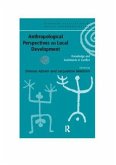Debt is often thought of as a mere economic variable governed by a simplistic mechanical logic, ignoring its other facets. Whose debt, and debt of what exactly? This volume analyzes debt as a political and social construct, with a multiplicity of purposes and agents. All of these are vectors of meanings that are highly diverse, and of subtle distinctions; they show that debt is a transverse phenomenon, cutting across spaces that are not merely economic but also domestic, social and political. Each contributor takes a fresh view of the subject, dealing with debt at a different time, in a different society, on a different scale of observation. By adopting a determinedly interdisciplinary approach, the authors reveal in the phenomenon of debt a diversity of social and gendered determinants that amount in some cases to domination, allegiance or slavery, and in others to solidarity and emancipation. Debt is at one and the same time shared, imposed, political and gendered.
Hinweis: Dieser Artikel kann nur an eine deutsche Lieferadresse ausgeliefert werden.
Hinweis: Dieser Artikel kann nur an eine deutsche Lieferadresse ausgeliefert werden.








